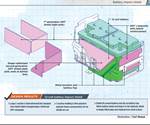SGL Carbon manufactures prototypes of composite battery cases
The battery boxes, developed with Chinese car manufacturer NIO for electric vehicles, feature lighter weight, high rigidity and lower thermal conductivity than aluminum or steel boxes.
SGL Carbon (Wiesbaden, Germany) announces that it has partnered with Chinese car manufacturer NIO to develop a prototype carbon fiber-reinforced plastic (CFRP) battery case for electric vehicles. The CFK battery case is said to be 40 percent lighter than conventional aluminum or steel battery boxes, and also features high rigidity and approximately 200 times lower thermal conductivity compared to aluminum.
"In addition, the composite material also scores with optimum values in terms of water and gas tightness, as well as corrosion resistance,” says Sebastian Grasser, market segment manager for the automotive for the composites - fibers & materials business unit at SGL Carbon.
The box floor and lid comprise a sandwich core combined with several layers of carbon gels. The tool design for the production of the floor and lid was developed in SGL's Lightweight and Application Center, and the carbon fiber for these components was manufactured in SGL plants in Moses Lake, Wash., U.S., and Muir of Ord, U.K., following by processing into scrims in Wackersdorf, Germany. The production of the floor and the lid as well as the assembly of the individual components was carried out SGL’s facility in Ried im Innkreis, Austria.
The housing of the battery is said to be particularly light, stable and safe. The entire battery box, including batteries, can also reportedly be replaced at NIO's own exchange stations within three minutes.
SGL Carbon expects that the demand for lightweight solutions for battery boxes in the automotive sector will increase sharply over the next few years as electro-mobility increases. The company is already working with various partners on the further development of different battery boxes made of composite material, which should in future be scalable for batteries of electric cars of all sizes and designs.
"Lightweight construction is one of the core elements of the NIO technology roadmap. With composite materials, especially the use of high performance carbon fibers in battery case systems, our vehicle offers better dynamic driving performance, a longer range and a remarkably high energy density of the battery pack (over 180 Wh/kg). These features are a perfect match for NIO brand values such as ultimate product and system efficiency,” says Bin Wei, senior manager of lightweight engineering at NIO.
Related Content
-
Automotive chassis components lighten up with composites
Composite and hybrid components reduce mass, increase functionality on electric and conventional passenger vehicles.
-
TPI manufactures all-composite Kenworth SuperTruck 2 cab
Class 8 diesel truck, now with a 20% lighter cab, achieves 136% freight efficiency improvement.
-
Carbon fiber, bionic design achieve peak performance in race-ready production vehicle
Porsche worked with Action Composites to design and manufacture an innovative carbon fiber safety cage option to lightweight one of its series race vehicles, built in a one-shot compression molding process.

.jpg;width=70;height=70;mode=crop)














